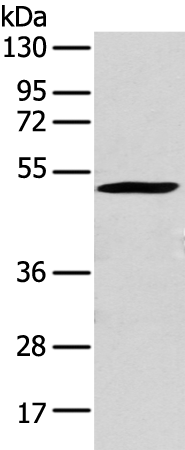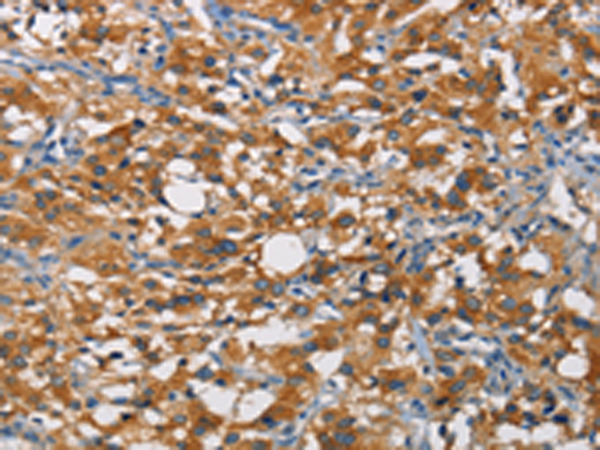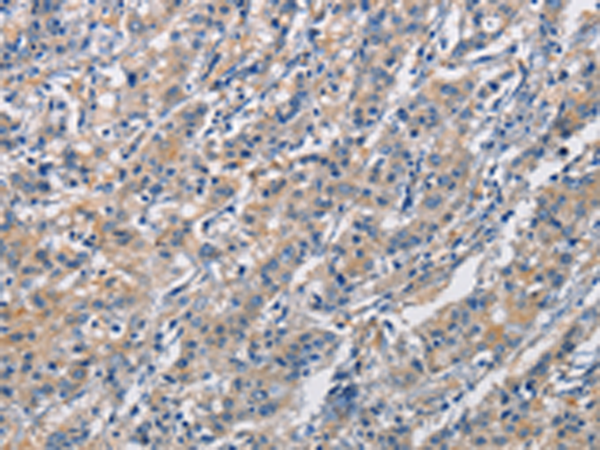


| WB | 咨询技术 | Human,Mouse,Rat |
| IF | 咨询技术 | Human,Mouse,Rat |
| IHC | 1/50-1/200 | Human,Mouse,Rat |
| ICC | 技术咨询 | Human,Mouse,Rat |
| FCM | 咨询技术 | Human,Mouse,Rat |
| Elisa | 1/2000-1/5000 | Human,Mouse,Rat |
| Aliases | CD355 |
| WB Predicted band size | 45 kDa |
| Host/Isotype | Rabbit IgG |
| Antibody Type | Primary antibody |
| Storage | Store at 4°C short term. Aliquot and store at -20°C long term. Avoid freeze/thaw cycles. |
| Species Reactivity | Human |
| Immunogen | Fusion protein of human CRTAM |
| Formulation | Purified antibody in PBS with 0.05% sodium azide and 50% glycerol. |
+ +
以下是关于CRTAM抗体的3篇代表性文献及其摘要内容的简要概括:
1. **文献名称**:**"CRTAM controls residency of gut CD4+CD8+ T cells in the steady state and maintenance of gut immune homeostasis"**
**作者**:Ishihara S. et al.
**摘要内容**:该研究发现CRTAM分子在肠道CD4+CD8+双阳性T细胞的定位和稳态维持中起关键作用。通过使用CRTAM抗体阻断实验,揭示了CRTAM与其配体Necl2的相互作用调控肠道T细胞的驻留,并影响肠道免疫耐受和炎症反应。
2. **文献名称**:**"CRTAM antibody enhances antitumor immunity by disrupting the interaction between CRTAM and Necl2"**
**作者**:Kennedy J. et al.
**摘要内容**:研究报道了一种新型CRTAM中和抗体,通过阻断CRTAM与配体Necl2的结合,增强CD8+ T细胞和NK细胞的抗肿瘤活性。动物模型显示,该抗体可抑制黑色素瘤和结肠癌的生长,并提高免疫检查点抑制剂的疗效。
3. **文献名称**:**"CRTAM modulates the differentiation and function of Th17 cells in autoimmune diseases"**
**作者**:Wang Y. et al.
**摘要内容**:该研究探讨了CRTAM在Th17细胞分化中的调控作用。使用CRTAM特异性抗体干预后,实验性自身免疫性脑脊髓炎(EAE)模型小鼠的Th17细胞比例减少,中枢神经系统炎症减轻,提示CRTAM抗体可能成为治疗多发性硬化等自身免疫病的潜在策略。
4. **文献名称**:**"Structural basis of CRTAM recognition by its neutralizing antibody"**
**作者**:Zhang L. et al.
**摘要内容**:通过冷冻电镜和X射线晶体学解析了CRTAM蛋白与其中和抗体的复合物结构,揭示了抗体结合CRTAM的分子表位及阻断配体结合的机制,为开发靶向CRTAM的免疫治疗药物提供了结构生物学依据。
以上文献涵盖了CRTAM抗体在基础机制、疾病治疗和结构解析等方面的研究进展。如需具体文献来源或补充更多研究,可进一步提供方向细化检索。
CRTAM (Class I-restricted T cell-associated molecule) is a cell surface protein belonging to the immunoglobulin superfamily, primarily expressed on activated CD8+ T cells, γδ T cells, and natural killer (NK) cells. It plays a role in immune cell interactions, particularly in mucosal and inflammatory environments. CRTAM interacts with its ligand Necl2 (nectin-like molecule 2), expressed on epithelial and dendritic cells, facilitating cell adhesion and signaling. This interaction is critical for cytotoxic T cell function, including target cell recognition and immune synapse formation.
Research highlights CRTAM's involvement in modulating immune responses, such as promoting IFN-γ secretion and enhancing cytotoxic activity. Dysregulation of CRTAM has been linked to autoimmune diseases, chronic inflammation, and cancer progression. CRTAM antibodies, either monoclonal or polyclonal, are experimental tools used to study its biological functions, block CRTAM-Necl2 interactions, or detect CRTAM expression in tissues. Recent studies explore their therapeutic potential in immune-mediated disorders, including checkpoint inhibition in cancer immunotherapy. However, the exact mechanistic pathways and clinical relevance of CRTAM-targeting antibodies remain under investigation, with ongoing efforts to clarify their role in balancing pro-inflammatory and regulatory immune signals.
×